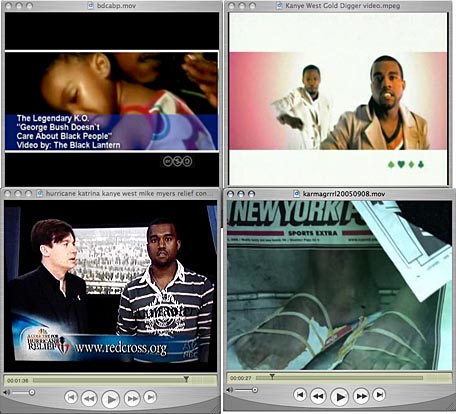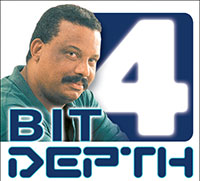BitDepth 493 - October 04
11/01/09 17:43 Filed in: BitDepth - October 2005
The music underground responds to Katrina with mashup music and video.
A rap hollaback for New Orleans

Clockwise from top left; Black Lantern’s video of KO’s rap, West and Foxx’s original video, Karmagrrrl’s re-edit of Green Day and the source of the outpouring, Myers and West on NBC
Of late, I haven’t been able to work much enthusiasm for rap and hip-hop music. After the witty enthusiasm of Busta Rhymes and the remorseless navel-gazing of Eminem, the landscape tends to flatten out into a relentless sameness of vacuous threats and faux anger from surly young men with barely clothed behinds gyrating in their faces staring out of bouncing Cadillacs.
There’s something compellingly primal about The Legendary KO’s “George Bush doesn’t care about black people,” which fuses Kanye West’s astonishing statement on NBC’s Concert for Hurricane Relief with West’s duet with Jamie Foxx on “Gold Digger.”
Explaining just how compelling the satire that the lads of KO, Houston’s Damien and Micah “Big $ Mic,” have created is becomes difficult because this is a family newspaper.
As with much of rap, the lyrics make liberal use of the F-word and the N-word, co-opted by these composers as both an identifier with street cred and as a familiar buddy term (there’s a radio friendly version).
To put all this work in context, it’s also worth tracking down and viewing the video of Kanye West and Mike Myers as they stir hearts on the pledge drive segment of that NBC concert.
After a scripted plea from Myers, West departs totally from the plan, offering an emotional and disjointed personal reading of the situation that vaccilates between his own initial ambivalence to the tragedy, the media’s portrayal of blacks trapped in the city and the enormity of the destruction. “They’ve been given permission to shoot us,” West says. Myers, clearly confused and discomfited by West’s statement, struggles to bring the show back on message. Then West gathers himself for his final words which will probably echo throughout the remainder of the Bush presidency.
The original song is a sprightly number featuring Kanye West rapping about women who put money over love over a soulful wail by Foxx who channels his Ray Charles impersonation to dramatic effect.
Released for download on the rapper’s website, the song channels barely controlled fury with a recasting of West’s lyrics for Gold Digger.
I can’t quote effectively from the rewritten rap, but the brutally frank lyrics gain a particularly dramatic resonance from Foxx’s untouched background vocal, “Can you hear me mama, Baby I’m in need, I’ve gotta leave...”
Soon after the release of KO’s revamp of the Kanye West song, Black Lantern engaged in a mashup of his own, creating an energetic video that uses New Orleans footage, clips from the Gold Digger music video and the NBC pledge break.
Another website, submediatv.com offers a more polished take on KO’s song by Franklin Lopez. In these videos, the marriage of angry vocal and filmed horror run even deeper, amplifying and clarifying the rage that Kanye West triggered with his infamous appearance.
At Karmagrrrl’s website, the latest video blog or vlog is an equally intriguing mashup of New Orleans news video cut to Green Day’s post-summer song “Wake me up in September” a sardonically mournful song that becomes particularly poignant when read against the scenes of chaos.
“Here comes the rain again,” Billie Joe Armstrong sings, “falling from the stars, drenched in my pain again, becoming who we are.”
As the video proceeds, Karmagrrrl’s cuts to the eerily prescient lyrics become ever more explosive, driving with a riveting marriage of news clips and chillingly appropriate lyrics the same message of scandalous dereliction that the rappers of The Legendary KO deliver with blunt irony.
The story here isn’t about the politics of these pieces but in the way they were created and distributed. It simply wouldn’t be possible to produce these videos without the consumer priced tools for audio and video production that have become commonplace over the last few years and the advances in connectivity that has made access to them possible. Before then, the only choices for creation and delivery lay in the professional realm and involved big tapes and expensive hardware.
The licensing and copyright issues of these works are hazy but what these videos are about is a gut reaction. Expression that’s found fertile ground in a commonly understood medium to tell an alternative, sometimes subversive version of the story of Katrina in New Orleans.
Kanye West’s passionate hijacking of mainstream media was just the beginning of unheard voices finding surprising new microphones.

Clockwise from top left; Black Lantern’s video of KO’s rap, West and Foxx’s original video, Karmagrrrl’s re-edit of Green Day and the source of the outpouring, Myers and West on NBC
Of late, I haven’t been able to work much enthusiasm for rap and hip-hop music. After the witty enthusiasm of Busta Rhymes and the remorseless navel-gazing of Eminem, the landscape tends to flatten out into a relentless sameness of vacuous threats and faux anger from surly young men with barely clothed behinds gyrating in their faces staring out of bouncing Cadillacs.
There’s something compellingly primal about The Legendary KO’s “George Bush doesn’t care about black people,” which fuses Kanye West’s astonishing statement on NBC’s Concert for Hurricane Relief with West’s duet with Jamie Foxx on “Gold Digger.”
Explaining just how compelling the satire that the lads of KO, Houston’s Damien and Micah “Big $ Mic,” have created is becomes difficult because this is a family newspaper.
As with much of rap, the lyrics make liberal use of the F-word and the N-word, co-opted by these composers as both an identifier with street cred and as a familiar buddy term (there’s a radio friendly version).
To put all this work in context, it’s also worth tracking down and viewing the video of Kanye West and Mike Myers as they stir hearts on the pledge drive segment of that NBC concert.
After a scripted plea from Myers, West departs totally from the plan, offering an emotional and disjointed personal reading of the situation that vaccilates between his own initial ambivalence to the tragedy, the media’s portrayal of blacks trapped in the city and the enormity of the destruction. “They’ve been given permission to shoot us,” West says. Myers, clearly confused and discomfited by West’s statement, struggles to bring the show back on message. Then West gathers himself for his final words which will probably echo throughout the remainder of the Bush presidency.
The original song is a sprightly number featuring Kanye West rapping about women who put money over love over a soulful wail by Foxx who channels his Ray Charles impersonation to dramatic effect.
Released for download on the rapper’s website, the song channels barely controlled fury with a recasting of West’s lyrics for Gold Digger.
I can’t quote effectively from the rewritten rap, but the brutally frank lyrics gain a particularly dramatic resonance from Foxx’s untouched background vocal, “Can you hear me mama, Baby I’m in need, I’ve gotta leave...”
Soon after the release of KO’s revamp of the Kanye West song, Black Lantern engaged in a mashup of his own, creating an energetic video that uses New Orleans footage, clips from the Gold Digger music video and the NBC pledge break.
Another website, submediatv.com offers a more polished take on KO’s song by Franklin Lopez. In these videos, the marriage of angry vocal and filmed horror run even deeper, amplifying and clarifying the rage that Kanye West triggered with his infamous appearance.
At Karmagrrrl’s website, the latest video blog or vlog is an equally intriguing mashup of New Orleans news video cut to Green Day’s post-summer song “Wake me up in September” a sardonically mournful song that becomes particularly poignant when read against the scenes of chaos.
“Here comes the rain again,” Billie Joe Armstrong sings, “falling from the stars, drenched in my pain again, becoming who we are.”
As the video proceeds, Karmagrrrl’s cuts to the eerily prescient lyrics become ever more explosive, driving with a riveting marriage of news clips and chillingly appropriate lyrics the same message of scandalous dereliction that the rappers of The Legendary KO deliver with blunt irony.
The story here isn’t about the politics of these pieces but in the way they were created and distributed. It simply wouldn’t be possible to produce these videos without the consumer priced tools for audio and video production that have become commonplace over the last few years and the advances in connectivity that has made access to them possible. Before then, the only choices for creation and delivery lay in the professional realm and involved big tapes and expensive hardware.
The licensing and copyright issues of these works are hazy but what these videos are about is a gut reaction. Expression that’s found fertile ground in a commonly understood medium to tell an alternative, sometimes subversive version of the story of Katrina in New Orleans.
Kanye West’s passionate hijacking of mainstream media was just the beginning of unheard voices finding surprising new microphones.
blog comments powered by Disqus

